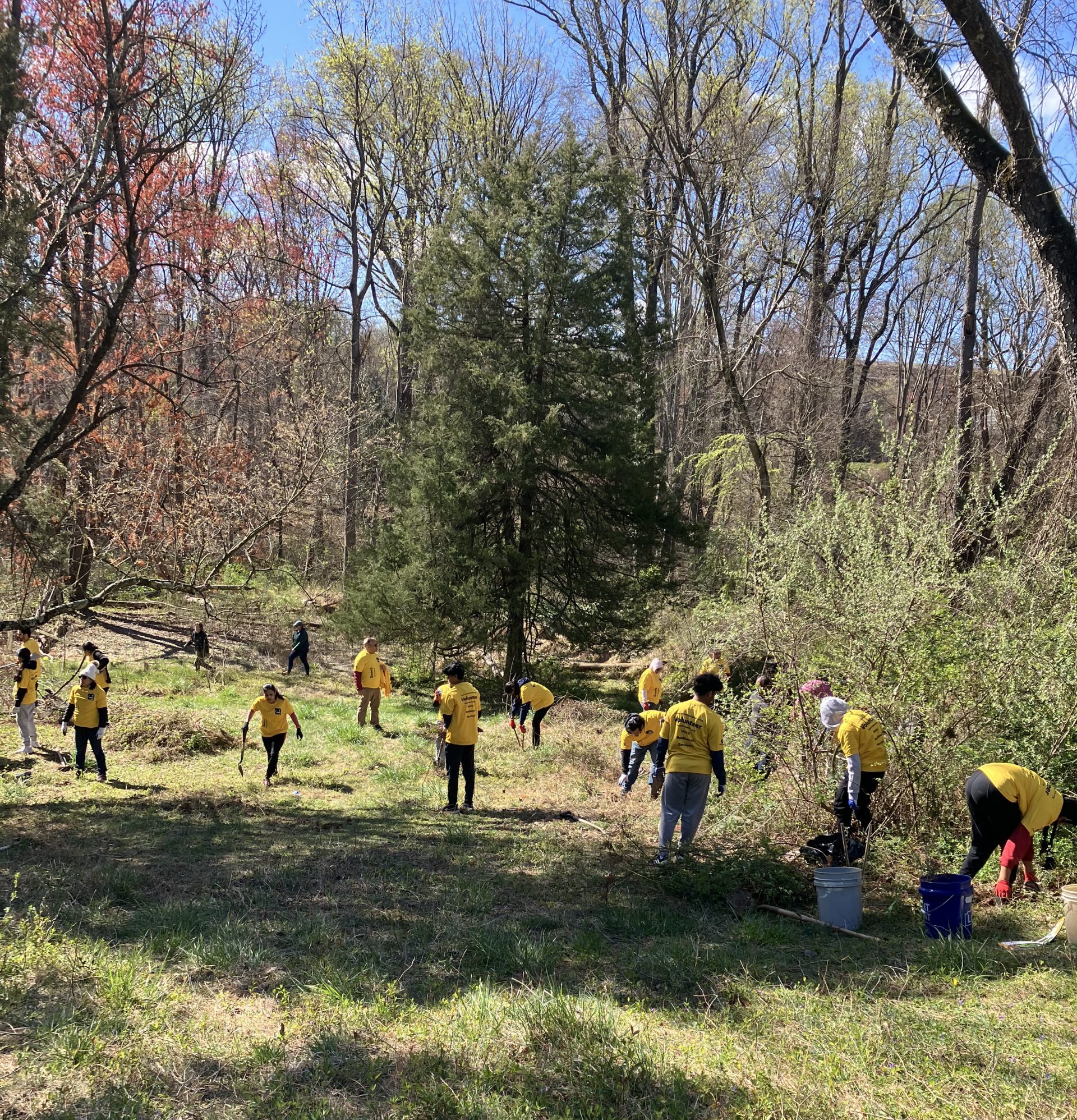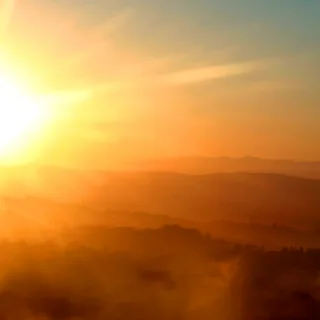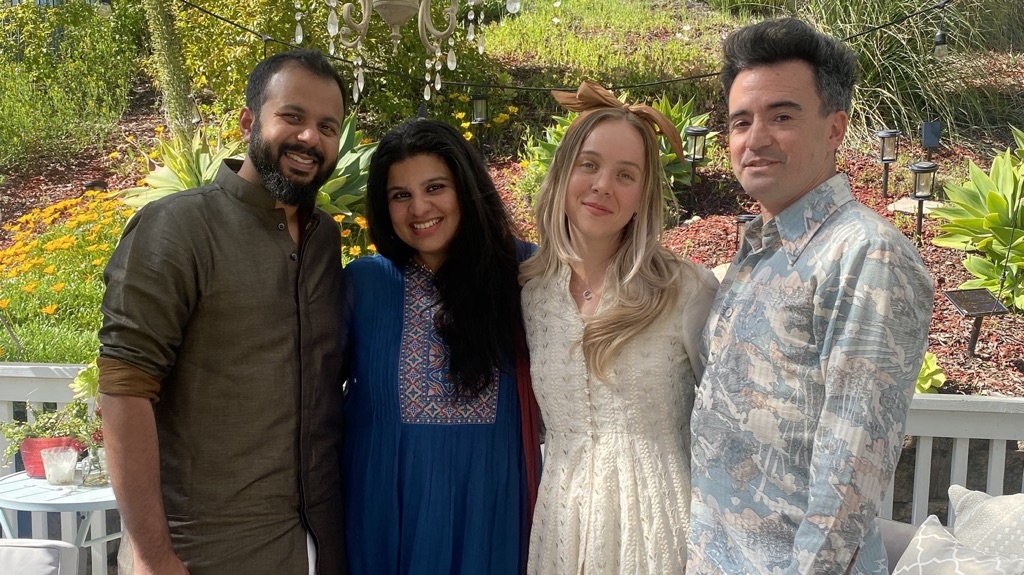
Contributed by Michael Goldberg, the Baha’i Community
In 1945, delegates from all over the world met in San Francisco to establish the United Nations. On May 19, they traveled to Muir Woods to honor the memory of President Franklin Delano Roosevelt.
President Roosevelt believed in the value of national parks as sources of inspiration and human renewal. He also believed that good forestry practices and sustainable development of natural resources were keystones to lasting peace around the world.
Organizers of the event hoped that the profound beauty and serenity of Muir Woods would inspire the delegates to pursue the president’s program for world peace.
Dag Hammarskjold, Secretary-General of the United Nations upon visiting Muir Woods in 1955 said, “Persons who love nature find a common basis for understanding people of other countries, since the love of nature is universal among men of all nations”.
We live in a polarized society with news and social media playing on our lower nature, causing feelings of anger and divisiveness. This is not healthy for our physical and spiritual well-being. If you turn your attention to the things that unite us, you will find yourself more tranquil and calm.
Connecting with nature can bring countless benefits. It can inspire questions about our purpose, our earthly existence. We experience awe and wonder at the beauty, magnificence and complexity of creation. Being in nature or even viewing scenes of nature reduces anger, fear, and stress and increases pleasant feelings. It gives you a sense of connection to something bigger than yourself. Countless studies have shown that nature has many therapeutic benefits for the mind, body, and spirit. Nature can make people feel more energized and less stressed while also increasing levels of happiness.
Communing with nature is not very complicated. You only have to go outdoors and attune yourself to the abundant life already there waiting for you. Treat yourself to happiness. You deserve it.
This blog post is the expressed opinion of its writer and does not necessarily reflect the views of Tysons Interfaith or its members.

By Yerusalem Work
You stood castle-high, singing on the midnight-moonlit balcony
Your voice reached across the vast, star-scattered skies
Tears poured from my eyes
You left a palace to address the issue of contentment
You gave us light—a messenger of the messengers
My thoughts took flight
The height of a hummingbird, the rhythm complete with hope inside me
You elevate me
I face you and my soul smiles,
the kiss of peace greeting you with solemnity
In a labyrinth of faith-filled promises,
I push against the walls of fear and regret.
I travel with poetry as my guide.
You illuminate the day and night
with your heart’s meditation
The fire you put in me makes me rise to my feet–
I see shadows repeat in a cave of my doing,
but nothing can compare to your presence
Only now can I breathe
with depth and freedom,
only now do I discover the unveiling of life, the mystery of being
Through love,
I become human
Through prayer,
I experience divine union and
the absence of time.
You, the cliff’s edge, are sublime.
You, a decorated hero, are the friend I find by the riverside.
Dipping in our consciousness…never the same feeling twice.
Happiness. Lovingkindness.
Splashing in knowledge, refreshing, an awakening,
I ask you to dream with me and carry me with you through our journey.
I am a butterfly alight on your shoulder.
Graceful movement. Grateful conclusions.
Reading into you. I believe in forgotten truths.
I pray the Lord heals me and you.
After terrible loss,
having a hand to hold is proof of God’s mercy.
I am on my knees and only He can hear me.
Who truly knows me?
To hear the author read this poem, please visit: https://www.facebook.com/100004823402356/posts
Yerusalem Work, a creative writer and the membership director of the Congregational Library Association, has a heart for interfaith dialogue and is a passionate community builder. A holder of a master’s degree in library science and prolific author, she regularly blogs and self-publishes her writing. Her short stories and poetry have been published in Muslim Matters and Tysons Interfaith. She considers it an honor and a pleasure to write on Islamic themes.
This blog post is the expressed opinion of its writer and does not necessarily reflect the views of Tysons Interfaith or its members.

Contributed by Dr. Trish Hall, Center for Spiritual Living, Metro
The International Day of UN Peacekeepers is May 29. In this two-part series, Dr. Trish Hall explores the concepts of peacekeeping and peacemaking, and the importance of “being peace” in our world.
In the days following the Hamas attack on Israel on 7 October 2023, Russell M. Nelson, president of the Church of Jesus Christ of Latter-Day Saints, called on members of his church and the people of the world to become peacemakers.
Nelson declared, “The path to becoming a peacemaker is often misunderstood. We too often focus on outward behaviors rather than the principles of peacemaking. Peacemaking is a quest that will test the best within us.”
Many peacekeepers and peacemakers are pacifists – people who believe that war and violence are unjustifiable. Peacemakers and peacekeepers share a single purpose: to create a world that works for all. How they approach achieving their shared goal of Peace is different. Both are needed as we grow human understanding.
Peacekeepers tend to focus on controlling behaviors. They do their utmost to maintain critical balance to prevent new hostilities. Peacekeeping is often frustratingly temporary as Nelson pointed out: “It controls surface behavior without solving the underlying issues that ignite anger, contempt, and distrust.”
Peacemakers seek to go beyond containment to unearthing the causes that burst forth as war, domestic assaults, race-riots, and gang violence. Through in-depth conversations into potentially volatile topics, mediation, negotiation and education they work to change outward behaviors from the inside by expanding understanding and building new relationships.
Both require:
Self-awareness – What is the state of your inner being? Are you peace, not just peaceful? Start your self-discovery by sitting quietly, allow your thoughts to slow down and become totally present with yourself. Release your engagement with your external and internal environment. What are you sensing? Draw Peace into your awareness. Sense Peace. Continue to be peaceful, affirm “I am Peace.”
Keen Alertness – Both our internal and external worlds are subject to anxiety and strife. We must be sensitive to what we are experiencing: Is it coming from our personal history? Is the current environment awakening old, unresolved issues? Are we taking on the emotions around us? To be present, alert observers, we must not get enmeshed in circumstances. We must differentiate intuitively in the moment, what is stemming from our internal world and what is originating externally. This may seem tricky. How can we deeply sense what is going on, without engagement and assess without interpreting, judging, or projecting?
It all begins in consciousness. We must challenge ourselves, clarify our convictions and honestly assess why we identify ourselves as peace people. What is it that is calling us to embrace being a stand for peace as our personal responsibility – to show up as Peace?
Next, we discern Divine Guidance and invite it to inform us as to how we are to be. Whether you engage in fervent plenary prayer, follow a practice of visioning, use the powerful practice of affirmative prayer or any other form, do what is yours to do to open to the Divine, open to the wisdom of the One Creator, listen to and glean guidance from Spirit.
Lastly, we must clearly, courageously do what Spirit within has decreed. Many of us have “heard a call,” even felt it deeply, and then let it fade. “Life got in the way.” Whether in prayer circles, meditation groups, uplifting individuals or being a mighty voice that can enroll others in changing how our populations relate to one another, we are the only ones that can shift the consciousness of our world in our particular way.
You may not realize your own importance or may question how what you do could possibly have any effect on much of anything, yet as Dr. Margaret Wheatley said, “One of the things we need to learn is that very great change starts from very small conversations, held among people who care. Forget about the politics … What are the things that you really have deep, abiding concern for? What is it you really have some passion for? If you go into that question for yourself, you will find the energy to go forward.” You will undoubtedly attract others who share your concerns. By asking crucial questions, you set change in motion, you unveil hidden limiting beliefs at their root, reveal pivotal misunderstandings and discover new possibilities.
Immerse yourself in the sensations of being a peace person – of letting the world know what you are by your presence, your words and actions. You are Peace.
Feel the vibrancy of being fully engaged as Peace. See and feel making a difference in your own unique way. You are Peace.
Well … don’t just sit there … Be it! Do it!
Start right now, in this new, now, present moment! Be a Peace Presence.
Remember: Everything you do matters!
This blog post is the expressed opinion of its writers and does not necessarily reflect the views of Tysons Interfaith or its members.

Contributed by Dr. Trish Hall, Center for Spiritual Living, Metro
The International Day of UN Peacekeepers is May 29. In this two-part series, Dr. Trish Hall explores the concepts of peacekeeping and peacemaking, and the importance of “being peace” in our world.
Do you have the courage to live your values even when confronted by powerful opposing views? Are you willing to stand with the oppressed, those who may have been treated unjustly? Do you have what it takes to sit in the fire of heated conversations to reveal harmonious solutions? If you answered, ‘yes’ to these questions, you may be a “peacemaker”.
In the early 1990’s I met a woman who was home on respite. She was a peacekeeper in Palestine. Hearing her stories of life in the occupied Gaza Strip were very different from the perspective I had accepted from the media. She was a Methodist serving Muslims, there to escort children to school and accompany adults to work. Faith traditions were irrelevant, only her commitment to be a presence for Peace mattered. She showed us pictures of spectacular scenery and beautiful olive groves and told of guns fired through the trees not aimed specifically at the men picking olives but instead to impose economic harm by scaring them from harvesting their crop. She told about walking the children to school and being stopped on the street by armed military personnel. We learned that she prayed every day for safe passage for the children and their families. Peacekeepers, whether serving as escorts, negotiating disarmament agreements, or removing landmines and explosives abandoned after wars, are clear about who they are and why they do what they do.
Peacekeepers are committed to moving world populations to safer ways of being … to peace with one another and within themselves. Peacekeepers come from all walks of life, in all sizes, ages and ethnicities, and play all roles in family and community (locally and internationally). For some it is a passion, a spiritual calling, a career, and for many a synthesis that shows up in every aspect of their lives. Years ago, we were called “peace-nics.”
Every May 29th, the United Nations celebrates International Peacekeepers Day. The day honors the more than 115,000 current members of the UN Peacekeeping Force and pays tribute to those who have lost their lives trying to make the world a better place. Since its creation 76 years ago, more than a million civilians and law enforcement personnel from 125 countries have served.
The UN Peacekeepers “wage a war against war.” There to protect and care for civilians, disarm ex-combatants, ensure ceasefires are kept and rules of law are observed, they support free and fair democracy with special emphasis on protecting human rights and particularly the rights and voices of women.
Gratefully, we join in this honoring, and we know that peacemaking and peacekeeping are the responsibility of each and every one of us!
This blog post is the expressed opinion of its writers and does not necessarily reflect the views of Tysons Interfaith or its members.

Contributed by: Susan Posey, Redeemer Lutheran, McLean
Many people set aside time in their day for prayer, reflection, or meditation, and there are so many wonderful resources for this type of daily grounding. One such resource is the Daily Lift, a daily audio reflection provided on-line by the Christian Science Church.
This week, I was blessed to hear a Daily Lift offered by Lois Herr, who is a local Christian Science Practitioner and Teacher, an active member of Tysons Interfaith, and my dear friend. In this segment entitled No such thing as “all by myself,” Lois shares an experience from her own life that illustrates her belief that by consistently turning to God for guidance, one can come to the spiritual reality that God’s care is always ready to appear in ways that we can understand.
The Daily Lift is comprised of audio presentations contributed by Christian Science church members worldwide – with the majority coming from the U.S. This particular “Lift” will remain on the website for thirty days before being retired.
As my friend Lois would say, “may this segment bring you peace and encouragement.” It did so for me.
This blog post is the expressed opinion of its writer and does not necessarily reflect the views of Tysons Interfaith or its members.

Contributed by Stephen Wickman, St. Thomas Episcopal, McLean
I’ve just been introduced to al-Ghazali, a perceptive medieval Islamic scholar, who among other things looks at the old adage that patience is a virtue. His exploration of the subject is featured in an on-line article authored by Northeastern Professor Liz Bucar on the website The Conversation. It is entitled: “3 things to learn about patience and impatience — from al-Ghazali, a medieval Islamic scholar.”
I know I am impatient. I want justice now, not later. But there is virtue in waiting patiently for the right moment, for the other person to finish their thought, something Jesus of Nazareth fully understood. So, I will pray for discernment as to whether patience – or impatience – is the better course to advance love, healing and justice in a given situation. And I will breathe and try to allow a little space for the Holy Spirit to work its graceful magic in my personal life and in this world.
This blog post is the expressed opinion of its writers and does not necessarily reflect the views of Tysons Interfaith or its members.

Contributed by: Dr Trish Hall, Center for Spiritual Living, Metro
Photo: SEWA International Volunteers Working in McLean Hamlet Park on April 6
Isn’t “inextricability” (incapable of being disentangled), a great word? Simply, we cannot get away from one another. The effects any of us have on the environment – on everyone and everything – affect us all directly and indirectly. What we do turns back on all of us. In the Judeo-Christian Bible, Cane asks, Am I my brother’s keeper? The answer is “Yes!” We are our brothers’ keepers and our sisters’ and mothers’ and fathers’ keepers. Everything each of us does impacts everyone, just some more than others.
The solution I am proposing is simple yet I do not claim it will be easy, although it could be. Since we are inextricably entangled in everyone else, the solution is a massive shift of consciousness. A shift at the systemic level that declares in words and more importantly in actions, that we care. We care about the environment. We care about one another. We care about the world we are leaving to our offspring. Simply, WE CARE! Some who declare that this approach is not simple, may even claim it is impossible. Believing that all things are possible, I don’t accept that perspective. I am confident that it not only is possible, it is sustainable! And attainment of sustainability requires the commitment and follow through of each person who cares!
There are millions of people and myriad programs that are doing great work and so long as their commitment and energy hold out, they are sustainable. Fortunately, new recruits come along that are dedicated and step in when those in the trenches fatigue. They are valiant, amazing people. I laud them and applaud them. So long as the supply of new people does not wane, those programs will continue.
Some, perhaps many, avowed environmentalists spend more energy focused on what other people are doing or not doing that damages the planet, than on doing something about the environment. Because of the crises cropping up on so many different fronts, this is critical work. Again, it is only sustainable so long as new crops of dedicated people continue to show up. Truly, we all need to take a stand against the violators, big and small.
I am inviting people to address the crisis at the systemic level. We need to dig deep and address the consciousness that is not only allowing the contamination of our environment, it is fostering and nurturing it. We live in a “throw away society,” that condones a disposable mentality. The ordinary, day-to-day insults to our environment result from a consciousness that stopped washing dishes. Instead, whether plastic or paper, throw it away and someone (bless the disposal facility personnel) will clean up after the general malaise and laziness. Alas, there are millions of people who simply drop their trash wherever they are. A few rationalize that what they are dropping in the streets and parks is biodegradable. Some don’t care at all. They apparently assume that the clean-up fairy will come along behind them and fix it. Some don’t even care whether it is cleaned up.
The big violators must be called out! We know we must be a clear stand for stopping the harm they are perpetrating yet feel that stopping those entities is so huge that all our feelings of inadequacy arise. Rather than remaining in a state of paralysis, I choose to turn to what I/we can do. By releasing the sense of overwhelm on the huge scale, we have more energy to devote to what we can do … and there is always something that each one of us can do to change the world and help heal the planet.
We can conserve energy by stopping finger pointing and blaming on the local level, join with others and pick up after the thought-less members of society before we drown in others’ waste. Tysons Interfaith and many other organizations do park and highway cleanups applying critically needed Band-Aids that are not ongoing remedies. They are short term and again, so long as new volunteers show up to replace burned out ones we can maintain. But maintaining is not sustaining.
A shift of consciousness is required for us to switch to a truly sustainable solution. There are valiant souls who are already taking this approach, and there are those who complain but do not act. To be sustainable, it is critical for us to embrace a “both/and” approach. There are those who educate about the fragility of our environment. Often, they and their students are the ones picking up after the contaminators. It requires a shift in consciousness from “why should I pick up after someone else,” to “it pleases me to have a pleasant environment, so I’ll pick it up.” It calls us to commit to events like river and park clean ups and even closer to home … perhaps the trash in front of the neighbor’s house.
This is where “inextricability” comes in. We cannot be separated from one another … our beings cannot be disentangled.
The indigenous peoples around the world have always known and taught their offspring that we are inseparable from our environment and from one another. Traditionally, they honor Oneness … they honor Mother Earth and all of her inhabitants. We are our brothers’, sisters’, mothers’, fathers’ and strangers’ keepers.
Whether we like it or not, we are responsible for one another. Let’s remind ourselves that we are all spiritual beings. Brene Brown defines spirituality as, “…recognizing and celebrating that we are all inextricably connected to each other by a power greater than all of us, and that our connection to that power and to one another is grounded in love and compassion. Practicing spirituality brings a sense of perspective, meaning, and purpose to our lives.”
When we immerse ourselves in the awareness of Oneness taking care of our planet and its inhabitants is no longer a burdensome responsibility. It becomes a celebration of interconnectedness and an opportunity to uplift the awareness of others. It is our opportunity until others learn and embrace their responsibility. The big question then becomes, “how are we to shift the consciousness of the world?” When I phrase it that way, it does feel immense and overwhelming. Let’s “chunk it down to bite size pieces.”
As Jana Stanfield declares in her song, “All the Good” … “I cannot do all the good the world needs, but the world needs all the good I can do.” We each must ask ourselves, “what small thing can I do?” and then do it consistently so that it grows. One of the easiest things is to embrace the concept of being an “exemplar” – a person serving as a typical example or excellent model. People learn by observation. When we are each an observable example of how we value and care for Mother Nature we are teaching others how they, too, can change the world for the better. Whether they like it or not, we have then influenced that behavior and their choices. They are different simply by being exposed to us. The ultimate result is a shift of their consciousness.
So ask yourself, “If not me, who? If not now, when? Embrace Margaret Mead’s admonition: “Never doubt that a small group of thoughtful, committed citizens can change the world; indeed, it’s the only thing that ever has.”
Let’s change the world starting right now!
This blog post is the expressed opinion of its writers and does not necessarily reflect the views of Tysons Interfaith or its members.

Contributed by Stephen Wickman, St. Thomas Episcopal, McLean
Sometimes, when I have trouble sleeping, I listen to the BBC. A recent segment entitled Mary’s Pain, a Lenten Talk offered by Dr. Selina Stone, touched me deeply.
Dr. Stone uses the period of Lent to come to terms with grief and loss she experienced in the untimely death of her mother to cancer. She shares Mary’s story as encouragement to all who mourn or struggle with the large problems facing our world.
This particular offering was first broadcast on March 11 and will be available for twenty-seven days.
As Christians prepare to enter holy week, may it offer anyone who cares to listen, peace.
This blog post is the expressed opinion of its writers and does not necessarily reflect the views of Tysons Interfaith or its members.

Contributed by Stephen Wickman, St. Thomas Episcopal, McLean
“The mind is involved in religion, but in more subtle ways. Christian traditions have many objects, rituals, and gorgeous buildings that create a spiritual atmosphere that helps the heart along. Judaism is perhaps the most embodied religion of all, requiring hundreds of specified obligations and actions governing dress and food, marital relations and business dealings, even the structure and society of prayer. In the Jewish tradition these are not separate from but an expression of a covenantal relationship with the creator of the universe.”
As we move further into Ramadan and Lent, I was struck by this message that came into my inbox. The author (Johnathan Silver, the author of Mosaic Magazine) takes issue with those who “have a very abstracted view of what religion is and the role it plays in human life,” and seem to believe: “The key to religious devotion is the acceptance of a tenet of faith.”
Nothing could be further from the truth.
To read the article in full, please visit:
https://manage.kmail-lists.com/subscriptions
This blog post is the expressed opinion of its writers and does not necessarily reflect the views of Tysons Interfaith or its members.

Contributed by Stephen Wickman, St. Thomas Episcopal
I received this beautiful message from NPR highlighting their listeners prayers this Ramadan, which begins today or tomorrow, depending on the sighting of the new moon in Saudi Arabia. https://www.npr.org/2024/03/10/1237049818/ramadan-prayers-2024-eid-muslims-peace-gaza-empathy. This is a powerful reminder to non-Muslims everywhere of the humanity and spiritual depth of Islam as practiced in our great nation today, and I hope everyone will take a moment to reflect on what our Muslim neighbors are saying.
My son was born in Riyadh, where I worked in the U.S. embassy, so I have very fond remembrances of the kingdom. As a non-Muslim, I could not visit Mecca and Medina, but I could share in the daily call of the muezzins and the deep spirituality of this most sacred season.
I hope you will join us in celebrating this most holy month of fasting, prayer, and fellowship,
This blog post is the expressed opinion of its writers and does not necessarily reflect the views of Tysons Interfaith or its members.
